Complete Solutions to SET -I of chapter XII BOARDS of Class 12 book with complete answers and questions
| Class 12 | PHYSICS |
| Chapter | XII BOARDS |
| XII BOARDS PREVIOUS YEAR | SET -I |
| Number Of Questions | 34 |
| Academic Year | 2023-24 |
Name the physical quantity which has its unit joule `"coulomb"^(-1)`. Is it a scalar or vector quantity?
View SolutionA beam of `alpha` particles projected along + x-axis, experiences a force due to a magnetic field along the +y-axis figure. What is the direction of magnetic field.
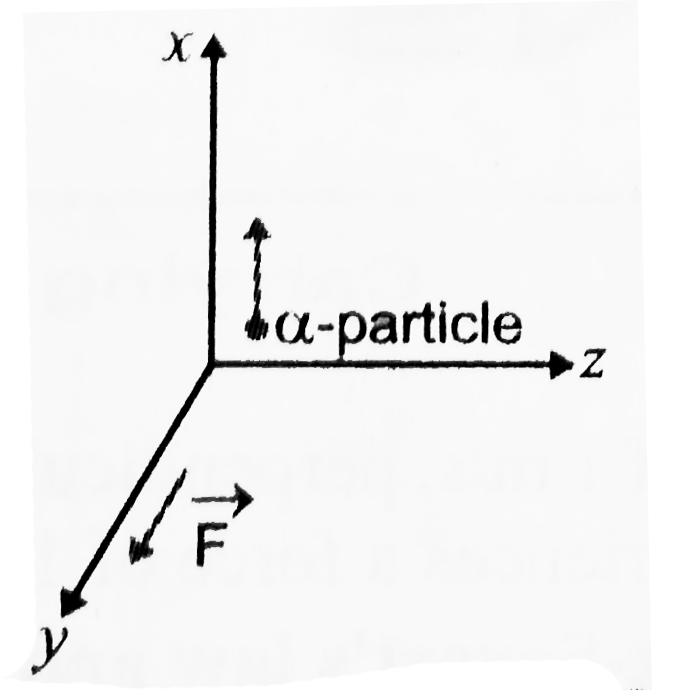
View SolutionDefine self-inductance of a coil . Write its S.I. units ?
View SolutionA converging lens is kept coaxially in contact with a diverging lens - both the lenses being of equal focal length . What is the focal length of the combination ?
View SolutionDefine ionisation energy. What is the value for a hydrogen atom?
View SolutionTwo different wires X and Y of same diameter but different materials are joined in series across a battery. If the number density of electrons in X is twice that in Y, find the ratio of drift velocity of electrons in the two wires .
View SolutionName the part of electromagnetic spectrum whose wavelength lies in the range of `10^-10m`. Give its one use.
View SolutionWhen light travels from a rarer to denser medium, it loses some speed. Does the reduction in speed imply a reduction in the energy carried by the light wave ?
View SolutionWhat is the magnitude of the equatorial and axial fields due to a bar manget of length `5*0cm` at a distance of `50cm` from its mid-point? The magnetic moment of the bar magnet is `0*40Am^2`.
View SolutionA spherical conducting shell of inner radius `r_(1)` and outer radius `r_(2)` has a charge Q.
(a) A charge q is placed at the center of the shell. What is the surface charge density on the inner and outer surfaces of the shell ?
(b) Is the electric field intensity inside a cavity is (with no charge) zero, even if the shell is not spherical, but has any irregular shape ? Explain.
View SolutionHow are electromagnetic waves produces by oscillating charges ? Draw a sketch of linearly polarized EM waves propagating in z-direction. Indicate the direction of oscillating electric and magnetic fields
View SolutionShow that the electric field at the surface of a charged conductor is given by `vecE = (sigma)/(epsi_(0)) hatn` , where `sigma` is the surface charge density and `hatn` is a unit vector normal to the surface in the outward direction .
View SolutionTwo identical loops , one of copper and the other of aluminium , are rotated with the same angular speed in the magnetic field . Compare (i) the induced emf and (ii) the current produced in the two coils .
Justify your answer .
View SolutionA proton and deuteron are accelerated by same potential difference.Find the ratio of their de-Broglie wavelengths.
View SolutionWrite two factors justifying the need of modulating a signal.
A carrier wave of peak voltage `12 V` is used to transmit a message signal. What should be the peak voltage of the modulating signal in order to have a modulation index of 75% ?
View SolutionWrite Einstein's photoelectric equation. State clearly any two salient features observe in photoelctric effect, which can be explained on the basis of the above equation.
View SolutionDraw a plot of potential energy of a pair of nucleons as a function of their separation . Write two important conclusions which you can draw regarding the nature of nuclear forces .
View SolutionDraw a plot of the binding energy per nucleon as a function of mass number for a large number of nuclei , `2 le A le 240` . How do you explain the constancy of binding energy per nucleon in the range `30 lt A lt 170` using the property that nuclear force is short-ranged ?
View Solution(i) Identify the logic gates marked P and Q in the given logic circuit.
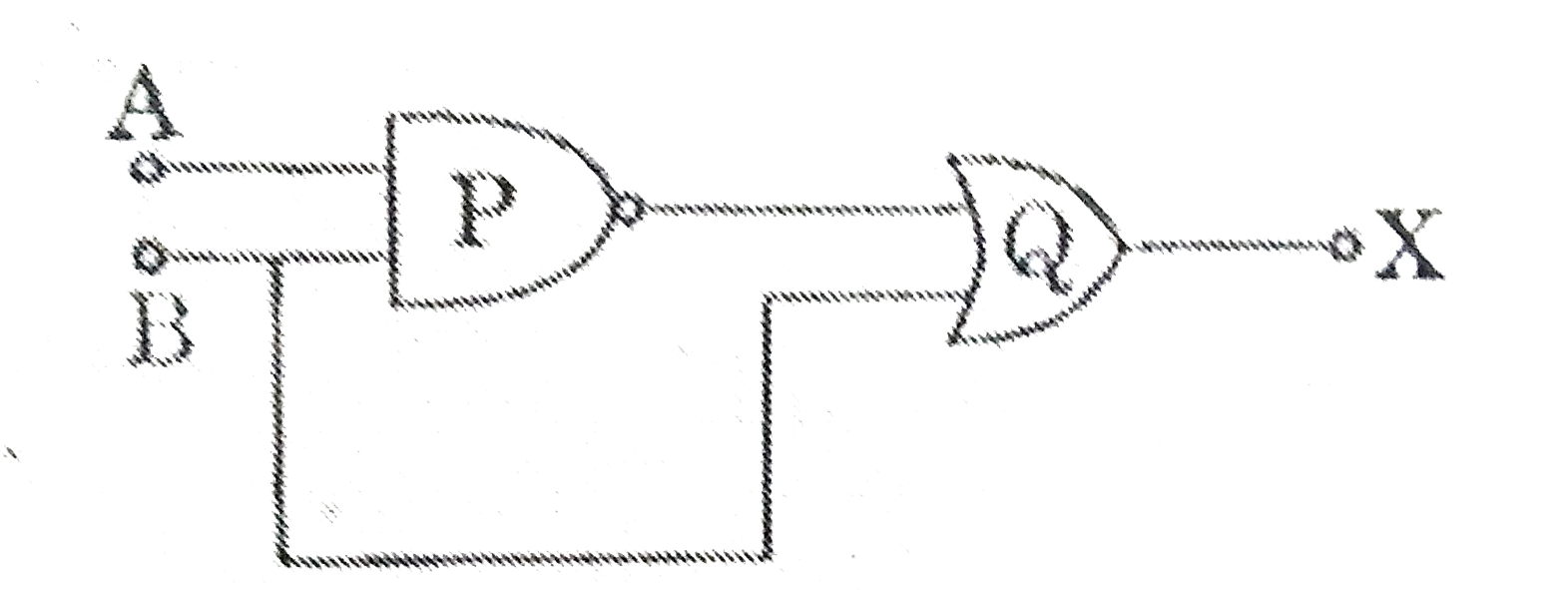
(ii) Write down the output at X for the inputs A = 0 , B = 0 and A = 1 , B = 1.
View SolutionWhich mode of propagation is used by short wave broadcast services having frequency range from a few MHz upto 30 MHz ? Explain diagrammatically how long distance communication can be achieved by this mode . Why is there an upper limit to frequency of waves used in this mode ?
View SolutionWrite any two factors on which internal resistance of a cell depends .The reading on a high resistance voltmer,where a cell is connected across it , is 2.2 V. When the terminals of the cell are also connected to a resistance of 5 `Omega` as shown in the circuit , the voltmeter reading drops to 1.8 V .Find the interval resistance of the cell.
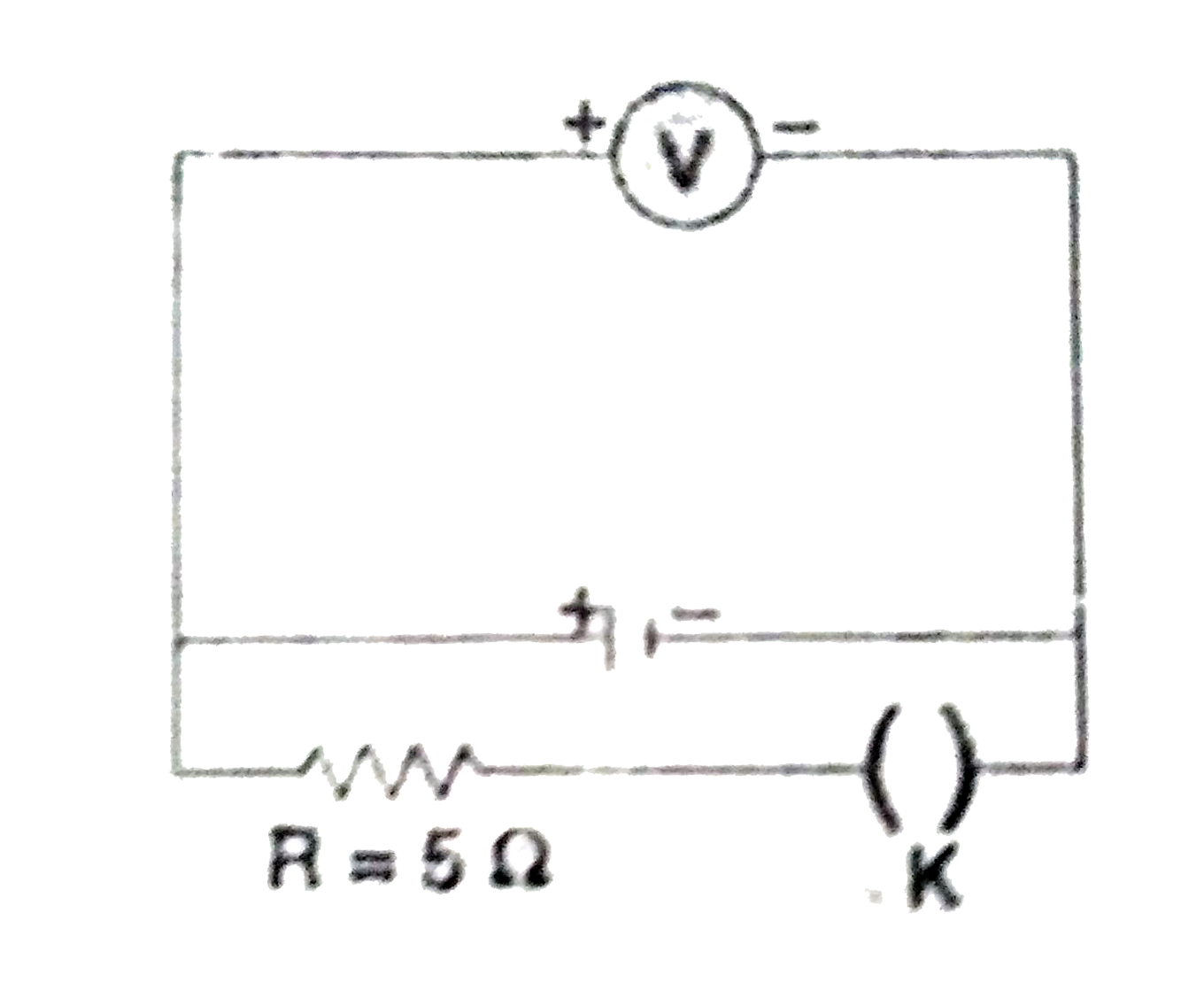
View SolutionA network of four each of `12 mu F` capacitance is connected to a `500 V` apply as shown in Fig.
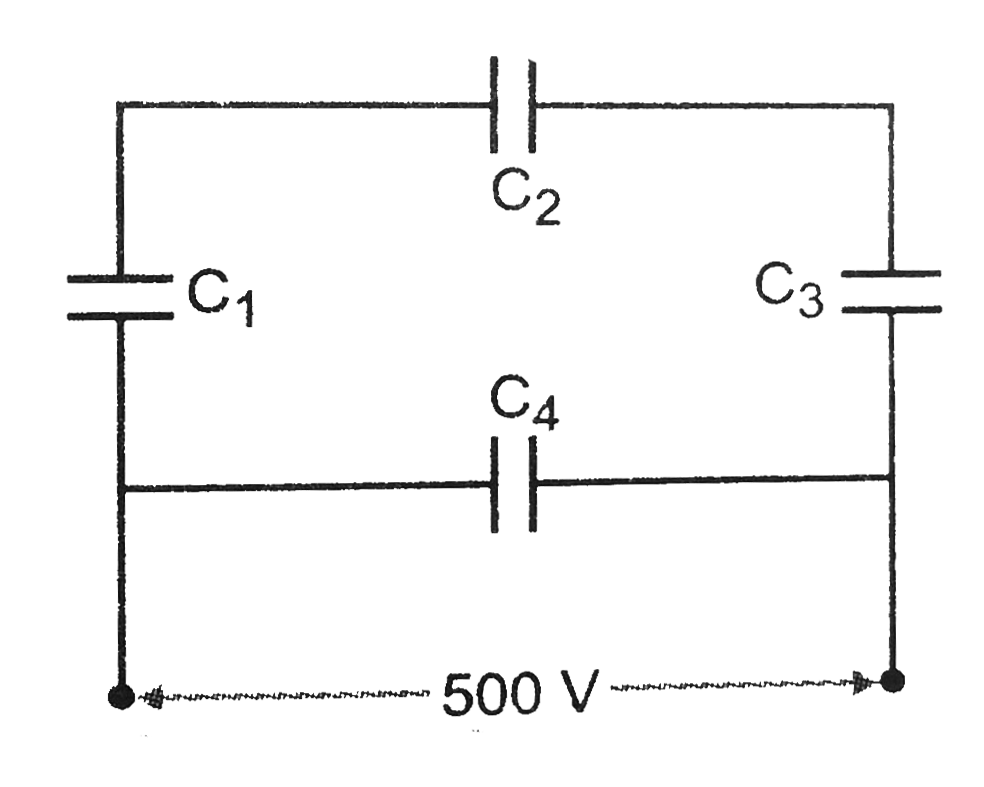
(a) Equivalent capacitance of the network.
(b) Charge on each capacitor.
View Solution(i) Draw a neat labelled ray diagram of an astronomial telescope in normal adjustment . Explain briefly its working .
(ii) An astronomical telescope uses two lenses of powers 10 D and 1 D . What is its magnifying power in normal adjustment ?
View Solution(i) Draw a neat labelled ray diagram of a compound microscope . Explain briefly its working .
(ii) Why must both the objective and the eye-piece of a compound microscope have short focal lengths ?
View SolutionIn Young's double slit experiment, the two slits `0.15 mm` apart are illuminated by light of wavelength `450 nm`. The screen is `1.0 m` away from the slits. Find the distance of second bright fringe and second dark fringe from the central maximum. How will the fringe pattern change if the screen is moved away from the slits ?
View SolutionUsing kirchhoff's rules wire the experssion for the current `I_(1) ,I_(2) and I_(3)` in the circuit diagram
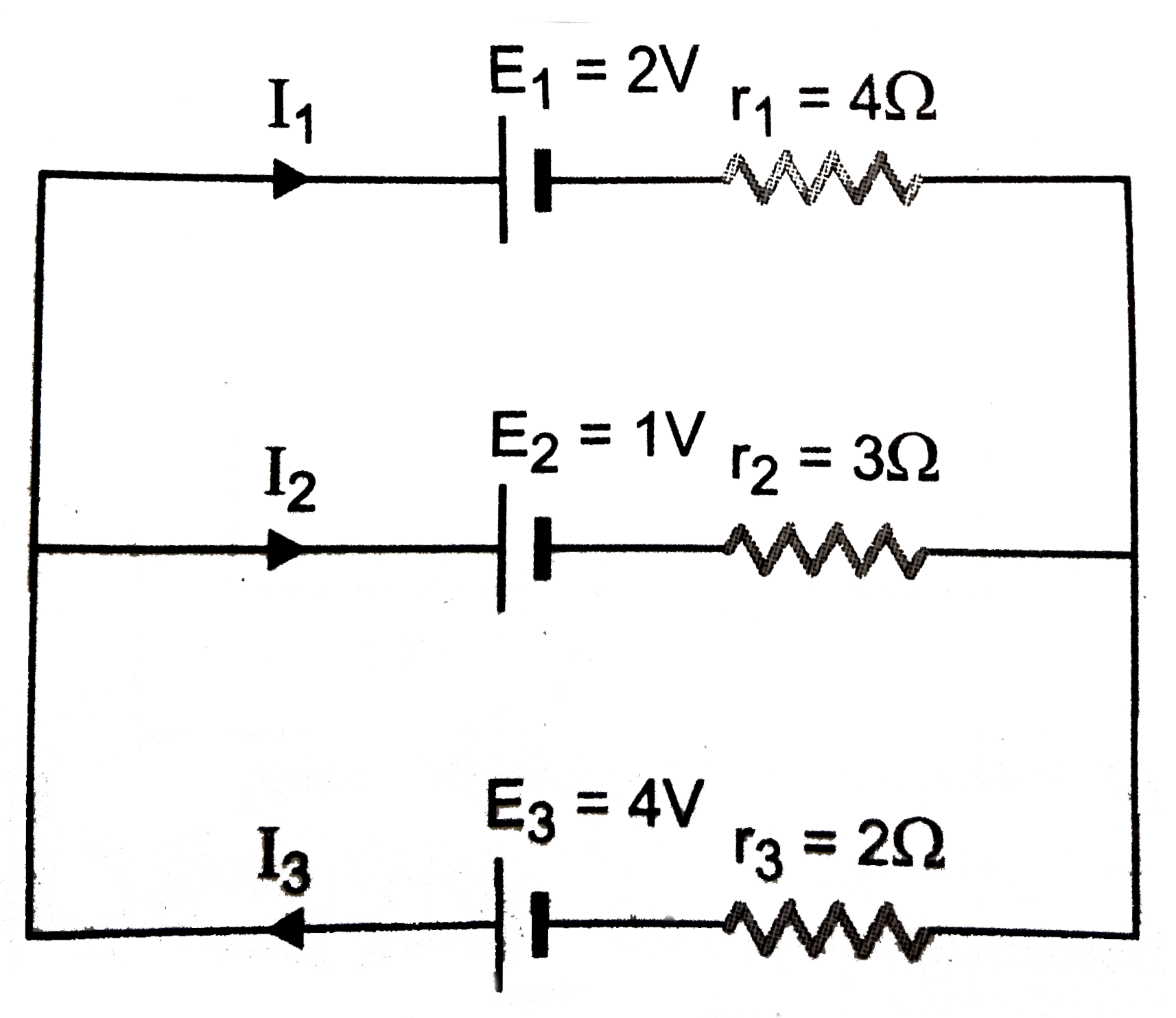
View Solution(a) Write symbolically the `beta`-decay process of `""_(15)^(32)P`.
(b) Derive an expression for the average life of a radionuclide . Give its relationship with the half-life.
View SolutionHow does an unpolarised light get polarised when passed through a polarised ?
Two polaroids are set in crossed positions . A third polaroid is placed between the two making an angle `theta` with the pass axis of the first polaroid . Write the expression for the intensity of light transmitted from the second polaroid . In what orientations will the transmitted intensity be (i) minimum and (ii) maximum ?
View SolutionAn illuminated object and a screen are placed `90 cm` apart. What is the focal length and nature of the lens required to produce a clear image on the screen twice the size of the object ?
View Solution(a) With the help of a diagram , explain the principle and working of a moving coil galvanometer .
(b) What is the importance of a radial magnetic field and how is it produced ?
(c) Why is it while using a moving coil galvometer as a voltmeter a high resistance in series is required whereas in an ammeter a shunt is used ?
View Solution(a) Derive an expression for the force between two long parallel current carrying conductors .
(b) Use this expression to define S.I. unit of current .
(c) A long straight wire AB carries a current I.A proton P travels with a speed v , parallel to the wire , at a distance d from it in a direction opposite to the current as shown in the figure . What is the force experienced by the proton and what is its direction ?
View SolutionState Faraday's law of electromagnetic induction .
Figure shows a rectangular conductor PQRS in which the conductor PQ is free to move in a uniform magnetic field B perpendicular to the plane of the paper . The field extends from x = 0 to x = b and is zero for `x gt b` . Assume that only the arm PQ possesses resistance r . When the arm PQ is pulled outward from x = 0 with constant speed v , obtain the expressions for the flux and the induced emf . Sketch the variations of these quantities with distance `0 le x le 2 b` .
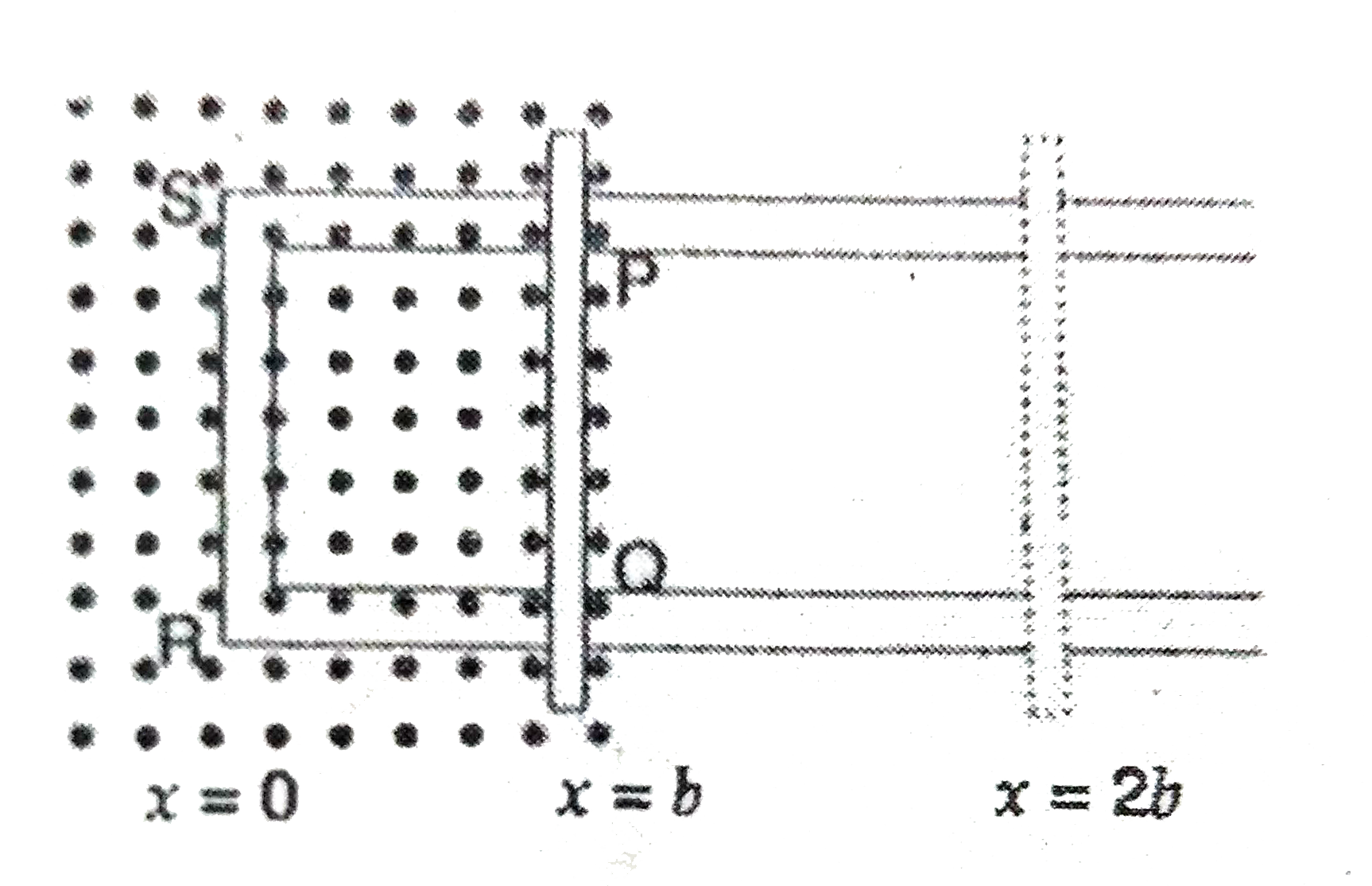
View SolutionDraw a schematic diagram of a step-up transformer . Explain its working principle . Deduce the expression for the secondary to primary
voltage in terms of the number of turns in the two coils . In an ideal transformer , how is this ratio related to the currents in the two coils ?
How is the transformer used in large scale transmission and distribution of electrical energy over long distances ?
View Solution(a) Draw the circuit arrangement for studying the input and output characteristics of an n-p-n transistor in CE configuration . With the help of these characteristics define (i) input resistance , (ii) current amplification factor .
(b) Describe briefly with the help of a circuit diagram how an n-p-n transistor is used to produce self-sustained oscillations .
View Solution
SET -I questions and complete solutions for chapter XII BOARDS of XII BOARDS PREVIOUS YEAR of Class 12
All Exercises from XII BOARDS PREVIOUS YEAR Class 12 PHYSICS XII BOARDS
- C.B.S.E.CLASS-XII PHYSICS (THEORY) [SET-I]
- C.B.S.E.CLASS-XII PHYSICS (THEORY) [SET-I]
- C.B.S.E.CLASS-XII PHYSICS (THEORY) [SET-I] (SECTION-A)
- C.B.S.E.CLASS-XII PHYSICS (THEORY) [SET-I] (SECTION-A)
- PHYSICS
- PHYSICS
- PHYSICS (Theory) DELHI BOARD -2016 [SET -I][COMPTT.]
- PHYSICS (Theory) DELHI BOARD -2016 [SET -I][COMPTT.]
- PHYSICS (Theory) [SET - III]
- PHYSICS (Theory) [SET - III]
- PHYSICS (Theory) [SET - II]
- PHYSICS (Theory) [SET - II]
- PHYSICS (Theory) [SET - I]
- PHYSICS (Theory) [SET - I]
- PHYSICS (Theory) [SET -I]
- PHYSICS (Theory) [SET -I]
- SECTION - C
- SECTION - C
- SECTION - A
- SECTION - A
- SECTION - B
- SECTION - B
- SECTION - C
- SECTION - C
- SECTION - D
- SECTION - D
- SECTION - E
- SECTION - E
- Section -A
- Section -A
- Section -B
- Section -B
- Section -C
- Section -C
- section -D
- section -D
- section -E
- section -E
- section A
- section A
- section B
- section B
- section C
- section C
- SECTION-A
- SECTION-A
- SECTION-B
- SECTION-B
- SECTION-C
- SECTION-C
- Section-D
- Section-D
- Section-E
- Section-E
- SECTIONS-B
- SECTIONS-B
- SECTIONS-C
- SECTIONS-C
- SECTIONS-D
- SECTIONS-D
- SECTIONS-E
- SECTIONS-E
- SET - I
- SET - I
- SET - II (Delhi Board)
- SET - II (Delhi Board)
- SET - III (Delhi Board)
- SET - III (Delhi Board)
- SET -I
- SET -I
- SET -II
- SET -II
- SET -III
- SET -III
- SET I
- SET I
- SET II
- SET II
- SET III
- SET III
- SET-I
- SET-I
- SET-I (SECTION-A)
- SET-I (SECTION-A)
- SET-I (SECTION-B)
- SET-I (SECTION-B)
- SET-I (SECTION-C)
- SET-I (SECTION-C)
- SET-I (SECTION-D)
- SET-I (SECTION-D)
- SET-I (SECTION-E)
- SET-I (SECTION-E)
- SET-II
- SET-II
- SET-II DELHI BOARD (SEC-B)
- SET-II DELHI BOARD (SEC-B)
- SET-II DELHI BOARD (SEC-C)
- SET-II DELHI BOARD (SEC-C)
- SET-II, DELHI BOARD
- SET-II, DELHI BOARD
- SET-III
- SET-III
- SET-III DELHI BOARD
- SET-III DELHI BOARD
- SET-III DELHI BOARD SEC-C
- SET-III DELHI BOARD SEC-C
- SET-III, DELHI BOARD
- SET-III, DELHI BOARD
- [SET - II DELHI BOARD]
- [SET - II DELHI BOARD]
- [SET - III, DELHI BOARD]
- [SET - III, DELHI BOARD]
- [SET - I]
- [SET - I]
- [SET -II, OUTSIDE DELHI]
- [SET -II, OUTSIDE DELHI]
- [SET -III, OUTSIDE DELHI]
- [SET -III, OUTSIDE DELHI]
- [Set- II]
- [Set- II]
- [Set-III]
- [Set-III]